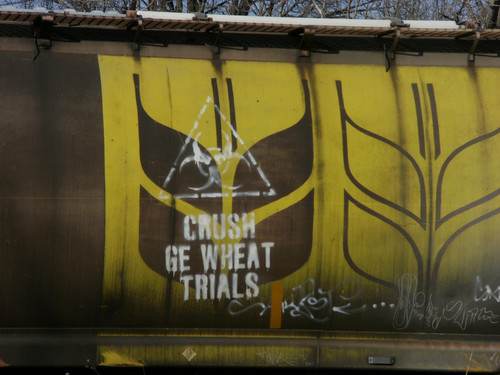"The EU Parliament's Environment, Public Health and Food Safety Committee
has voted that food produced using nanotechnology should be "excluded from the novel food list, and thus the EU market, until the possible health effects of nano production can be fully assessed." link
June 25, 2010
June 23, 2010
Don't give up the good alfalfa fight
KANSAS CITY, June 23 (Reuters) - More than 50 U.S.
lawmakers are calling on the U.S. Agriculture Department to
keep Monsanto's (MON.N) biotech alfalfa out of farm fields,
despite a Supreme Court ruling this week that cleared the way
for limited planting pending environmental reviews.
The lawmakers said the biotech alfalfa presents too great a
risk to conventional and organic agriculture to ever allow it.
Here
lawmakers are calling on the U.S. Agriculture Department to
keep Monsanto's (MON.N) biotech alfalfa out of farm fields,
despite a Supreme Court ruling this week that cleared the way
for limited planting pending environmental reviews.
The lawmakers said the biotech alfalfa presents too great a
risk to conventional and organic agriculture to ever allow it.
Here
June 18, 2010
Monsanto vs Haitians
"On June 4th about ten thousand Haitian peasants marched to protest US-based Monsanto Company’s ‘deadly gift’ of seed to the government of Haiti. The march was seven kilometers from Papaye to Hinche, in a rural area on the central plateau, and was organized by several Haitian rural social movements that are proposing a development model based on food and seed sovereignty instead of industrial agriculture. Slogans for the march included “long live native maize seed” and “Monsanto’s GMO & hybrid seed violate peasant agriculture.”
Haitian peasants march against Monsanto Company for food and seed sovereignty Via Campesina
"On June 4th, 10,000 peasant farmers gathered in protest in Haiti to burn more than 400 tons of hybrid corn and vegetable seeds donated to the country by Monsanto. This was a hugely symbolic gesture and one that the rest of the world needs to listen to. Haiti is asking for our help in establishing a local, sustainable food system from the rubble that the country currently lies in. This is our opportunity to raise our voices in protest against Monsanto's involvement in the fragile beginnings of true food sovereignty in Haiti".
The Fight against Monsanto in Haiti Huffington Post
"Seeds are the center of food sovereignty. Without our seeds we cannot have food sovereignty. We want a system that relies as little as possible on any external products, like seeds or fertilizers. We want to produce something that is good and healthy for everyone. To be sovereign is to have control over seeds and land, techniques and knowledge—everything necessary for food."
Elias Freitas Mesquita, Creole Seed Project
Civil Eats
Five Questions Monsanto Needs to Answer about its Seed Donation to Haiti
Haitian peasants march against Monsanto Company for food and seed sovereignty Via Campesina
"On June 4th, 10,000 peasant farmers gathered in protest in Haiti to burn more than 400 tons of hybrid corn and vegetable seeds donated to the country by Monsanto. This was a hugely symbolic gesture and one that the rest of the world needs to listen to. Haiti is asking for our help in establishing a local, sustainable food system from the rubble that the country currently lies in. This is our opportunity to raise our voices in protest against Monsanto's involvement in the fragile beginnings of true food sovereignty in Haiti".
The Fight against Monsanto in Haiti Huffington Post
"Seeds are the center of food sovereignty. Without our seeds we cannot have food sovereignty. We want a system that relies as little as possible on any external products, like seeds or fertilizers. We want to produce something that is good and healthy for everyone. To be sovereign is to have control over seeds and land, techniques and knowledge—everything necessary for food."
Elias Freitas Mesquita, Creole Seed Project
Civil Eats
Five Questions Monsanto Needs to Answer about its Seed Donation to Haiti
June 16, 2010
Lilbuddy Macteeth gets a flock
I picked up four orphan lambs day before yesterday, almost weaned but I found an old goat to keep them company and provide a bit of refreshment. When they are done I'll have a bit of milk for my tea and possibly collect up enough to make cheese, which I haven't done for a very long time. Giving the lambs a bit of diluted milk twice a day is building intimacy between the lambs, the goat and I but Lilbuddy was nowhere to be seen this morning for chores. He hit the wire yesterday and I think he associates that pain with those creatures. This evening he joined us, trembling, then barking then whimpering as I milked the goat and fed the lambs. I think he understands we all belong and the little farm is a full circle now that we have some critters again.
Here they are!


Here they are!


June 11, 2010
remay tales
I had a tragic comedy here last night on the farm involving remay, or agricultural fabric...for non-gardeners that is a lightweight woven fabric that covers crop to prevent insect from landing and feasting or spreading disease and is an organic farmer's standby for salad greens and other sensitive things (carrots if rust fly is troublesome, for eg). It also speeds growth.
The remay on my old farm came in the long roll of 500 feet and we had these length of beds. One day coming home from market I witnessed a small wind tunnel that had grabbed an end and sucked it high (100 feet) into the air. I had a good view on the road above the valley where the fields lay as the tractor with loader full of rocks raced to the scene and helpers jumped and ran and tugged to get the long white sheet out of the wee tornado and constrained from whipping out the wee seedings.
Wind plays havoc here too, but have yet to see a tornado (just hurricane remnants), and yesterday's show was just my own damn fault: I was in hurry, it was late and I hungry and little Buddy was barking at the birds down in the creek - poised for trouble. It was time for dinner and the evening dog excursion...but I had one last task to do and I was rushing. I had weeded all day and the last task task was to till up the old salad and spinach beds to free up some space to plant. The garden is getting tight now for the tractor, so I eased into position, let down the tiller and set the pto in gear. I was focused on steering my old rig clear of the dill and beets in the beds on either side of the wheels, but I misjudged where the tiller dropped - I caught the remay end of the adjacent bed. I didn't notice for a good 20 feet. It had yanked the fabric off the turnips, lifting the little roots with it and rolled up neat on the shaft of the tiller. Amazing it rolled up clean and even and only tore where the tines ripped it the first few turns.
The turnips (Hakurai japanese salad)were ready to pick and were surprisingly undamaged. Buddy had to wait whilst I cussed and laughed and unrolled remay from the tiller (and then dealt with the turnips). On retrospect designing a tool that winds up a roll could be inspired here. Ditto with harvesting.
The remay on my old farm came in the long roll of 500 feet and we had these length of beds. One day coming home from market I witnessed a small wind tunnel that had grabbed an end and sucked it high (100 feet) into the air. I had a good view on the road above the valley where the fields lay as the tractor with loader full of rocks raced to the scene and helpers jumped and ran and tugged to get the long white sheet out of the wee tornado and constrained from whipping out the wee seedings.
Wind plays havoc here too, but have yet to see a tornado (just hurricane remnants), and yesterday's show was just my own damn fault: I was in hurry, it was late and I hungry and little Buddy was barking at the birds down in the creek - poised for trouble. It was time for dinner and the evening dog excursion...but I had one last task to do and I was rushing. I had weeded all day and the last task task was to till up the old salad and spinach beds to free up some space to plant. The garden is getting tight now for the tractor, so I eased into position, let down the tiller and set the pto in gear. I was focused on steering my old rig clear of the dill and beets in the beds on either side of the wheels, but I misjudged where the tiller dropped - I caught the remay end of the adjacent bed. I didn't notice for a good 20 feet. It had yanked the fabric off the turnips, lifting the little roots with it and rolled up neat on the shaft of the tiller. Amazing it rolled up clean and even and only tore where the tines ripped it the first few turns.
The turnips (Hakurai japanese salad)were ready to pick and were surprisingly undamaged. Buddy had to wait whilst I cussed and laughed and unrolled remay from the tiller (and then dealt with the turnips). On retrospect designing a tool that winds up a roll could be inspired here. Ditto with harvesting.
June 2, 2010
farmers are old
I can no longer think of my self as an exception: the young farmer! I am now part of the depressing statistic - farmers are old
See also The Greying of Farmers
I'm 50 tomorrow; Its neither old nor young but it is a half century.
My get cold quick feet may be the harbinger of a slow accumulation of creaks and complaints. I see the suffering of others I know and love and wonder when and if it will change. Can I slog on until....its sustainable bodily, socially.
Irony is, these pockets of fertility and bounty dotted everywhere in rural Canada seem to be ever more hitting the button of "safe haven" for local communities come some immanent disaster, market collapse, corporate crop failures, etc.
Its the wisdom of the land's perspective that keep these ancients hugged close, hanging on for dear life to these small farms knowing it will inevitably, tragically have to change.
See also The Greying of Farmers
I'm 50 tomorrow; Its neither old nor young but it is a half century.
My get cold quick feet may be the harbinger of a slow accumulation of creaks and complaints. I see the suffering of others I know and love and wonder when and if it will change. Can I slog on until....its sustainable bodily, socially.
Irony is, these pockets of fertility and bounty dotted everywhere in rural Canada seem to be ever more hitting the button of "safe haven" for local communities come some immanent disaster, market collapse, corporate crop failures, etc.
Its the wisdom of the land's perspective that keep these ancients hugged close, hanging on for dear life to these small farms knowing it will inevitably, tragically have to change.
Subscribe to:
Posts (Atom)


